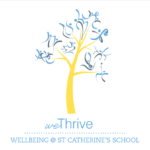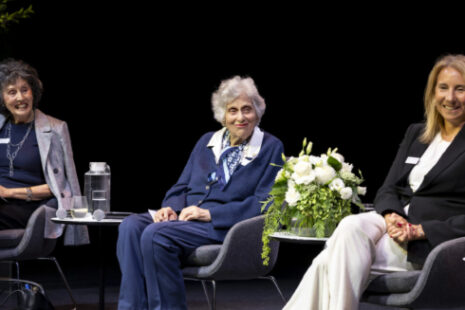Reflections on Emotional Growth

“Knowing yourself is the beginning of all wisdom”
Aristotle
The capacity to reflect on our emotional responses to challenge and change can correlate with the degree of personal growth that follows those experiences. The Years 7 to 11 students are currently reflecting on how they have managed and responded to the past semester’s remote learning and return to School, along with some of the learnings they have taken away from living through such uncertain times. The Semester 2 House Tutor Reports will incorporate these reflections as a lasting recollection of these significant experiences and milestones.
 St Catherine’s, Towards 2025 Strategic Plan, highlights the interrelationship between emotional intelligence, personal wellness and intellectual growth through our focus on the ‘academic care’ of each student. The weThrive: Wellbeing @St Catherine’s program provides a holistic journey embracing emotional, social, physical and cognitive development. Developing emotional intelligence continues to be an integral part of the program and since establishing our partnership with Swinburne University in 2015, the Aristotle EI Program has been taught across the School.
St Catherine’s, Towards 2025 Strategic Plan, highlights the interrelationship between emotional intelligence, personal wellness and intellectual growth through our focus on the ‘academic care’ of each student. The weThrive: Wellbeing @St Catherine’s program provides a holistic journey embracing emotional, social, physical and cognitive development. Developing emotional intelligence continues to be an integral part of the program and since establishing our partnership with Swinburne University in 2015, the Aristotle EI Program has been taught across the School.
Guided by the understanding that resilience and a sense of agency are essential for academic buoyancy and life-long emotional intelligence, our students are encouraged to recognise, critically evaluate and manage their emotions. The explicit and implicit teaching of recognition and regulation of emotions, developing empathy, understanding relationships, teamwork and leadership occurs from ELC to Year 12.
Daniel Goleman, renowned US psychologist and author of Emotional Intelligence, has explained EI simply in terms of ‘personal and social competence’. This definition is reflected in the Australian Curriculum ‘Personal and Social Capabilities’, which inform our teaching of self, and social awareness and management.
Several years ago, I was fortunate to attend a presentation and workshop with Marc Brackett, Founding Director of the Yale Centre for Emotional Intelligence. Professor Brackett’s book Permission to Feel, explains the Yale RULER method, an acronym for Recognising, Understanding, Labelling, Expressing and Regulating emotions. Brackett notes the importance of developing understanding and language to “label emotions accurately to increase self-awareness and communicate emotions effectively, reducing misunderstanding in social interactions.” This ‘emotional literacy’ is an important aspect of the focus we place at St Catherine’s on metacognition. Thinking about Thinking is essential to emotional, as well as academic development.
The development of EI vocabulary begins in the Early Learning Centre and is a feature of the Aristotle EI units at various levels through Barbreck and the Senior School. Importantly, Brackett emphasises that regulating emotions is “not about banishing negative emotions and feeling only positive ones, but rather, emotion regulation starts with giving ourselves and others the permission to own our feelings—all of them.” Meeting the various challenges presented through the pandemic and lockdowns has reiterated the importance of validating these feelings in order to then process and regulate them.
Brackett observes that “It’s possible to distract ourselves to such a degree that we avoid dealing with anything difficult—even when our lives would be improved by facing reality and doing something about it.” This ‘permission to feel strong emotions like anger or sadness or elation and joy,’ argues Brackett, can lead to personal growth and resilience through critical evaluation of these emotions.
Brackett acknowledges the need to accept all emotions as legitimate – some are more positive than others but we can learn from them. The experience of grief for example, whilst painful, need not be considered totally negative due to the growth that can follow. It is this thinking that has led to positive psychologists considering the ‘shadow side’ of character strengths, for example patience as opposed to impatience, which can be very instructive if tempered with new emotional literacy and regulation. The students’ introspection and reflection on the challenges will highlight the personal growth that has occurred despite these hurdles and goals set to meet further challenges and aspirations.
In regard to academic progress, Brackett’s research shows that “Our emotional state determines where we direct our attention, what we remember, what we learn and decision making”.
His research reveals that students with higher EI are ‘more engaged and motivated learners, more connected to their teachers, more prosocial and they perform better academically.’ In teaching emotional intelligence, students are encouraged to consider scenarios whereby when an event happens, it is their thoughts and interpretations of the event, and not the event itself, that lead them to experience certain emotions and feelings, and to act or react in particular ways. Importantly, this model proposes that while we often can’t change events, we do have the power to change the way we think about those events, and therefore how we feel and how we behave.
While each part of the brain develops at a different rate during childhood, the onset of puberty marks one of the most sweeping periods of pruning. Several brain areas critical for emotional life are among the slowest to mature. While the sensory areas mature by childhood and the limbic areas by puberty, the frontal lobe – the seat of emotional understanding, self-control and artful response – continue to develop into late adolescence.
We look forward to your daughter sharing some of her reflections and subsequently displaying some of the new learnings that can arise from adversity.





